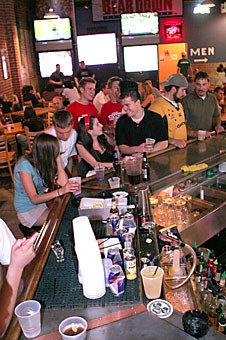Two years after state legislators passed a law extending the sale of alcohol from 1 a.m. to 2 a.m., bar owners near campus said they have not seen an increase in business.
Joe B. Harris, a manager at Maloney’s Tavern, 213 N. Fourth Ave., said people are just going out later than they used to since the law was enacted Aug. 31, 2004.
“”Before the law was passed, people would arrive at the bar around 10 p.m. Now people are showing up around 11 or 11:30 p.m.,”” said Harris, who has worked at Maloney’s for the past four years.
The law may have had made a difference in the service industry when it first went into place and bartenders enjoyed a brief spike in profits, but that has since leveled out, said Codi Cross, head bartender of the Wildcat House, 1801 N. Stone Ave.
“”I made $200 to $300 more when I was bartending back then,”” Cross said. “”But that has balanced out since.””
Cross said the Wildcat House will do last call around 1:30 a.m., but by that time, patrons have cleared out on their own.
The later last call was signed into law by Gov. Janet Napolitano in 2004 after lobbyists from Arizona’s tourism industries said the state’s early last call was hurting business.
However, after Napolitano extended the last call, bar employees said they were unhappy to work later with no guarantee that profits would increase.
The Shanty, one of many bars on the popular Fourth Avenue strip, only enforces the 2 a.m. deadline on Thursdays, Fridays and Saturdays, said owner Bill Nugent.
“”We weren’t thrilled about it at all,”” Nugent said.
Increasing the amount of time people can drink sends a mixed message to people from the legislators who are trying to crack down on overconsumption and drunk driving, Nugent said.
Nugent would prefer to have the “”12-to-12″” system adopted by some states, where alcohol can only be sold in between noon and midnight.
Nugent said that the law did not affect their sales and that their clientele typically leaves before last call in order to avoid the police officers who target the Fourth Avenue area for drunk drivers.
Danny Martin, a fine arts graduate student, said he has seen no real difference since the law was passed.
“”People are already pretty drunk by 1 a.m.,”” Martin said.
“”Yeah, if they’re doing their jobs right,”” added Dave Gibbs, a non-degree-seeking graduate student.
Sara Britko, a senior majoring in animal sciences who works as a server for Frog and Firkin, 874 E. University Blvd., said she supported the hour extension.
Although bars may lose money because of staff wages, Britko said from a server’s perspective, “”it’s great because we have an extra hour to make money.””
Britko, who moved to Arizona from New Mexico, where a 2 a.m. liquor law was already in place, said having last call at midnight is too early and having it at 4 a.m. is too late, but 2 a.m. is a reasonable time because it is right in the middle.









